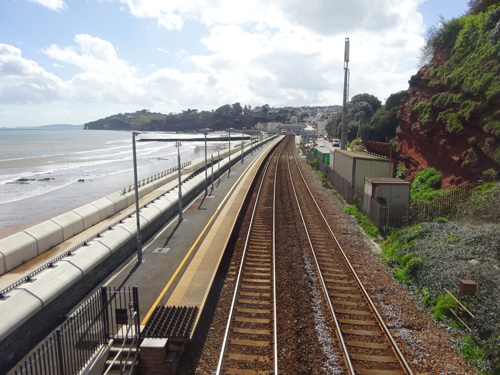
13/04/2023Phil’s Travels – Dawlish, England (04.23)
What with the confluence of religious events (Ramadan, Passover and Easter), last week was a quiet week in London, with fewer pedestrians and vehicles on the capital’s normally log-jammed pavements and roads. Whereas the streets may have been easier to navigate, the weather was a replacement challenge. On one crazy day, we had hot sun and blues skies in the morning, rain at lunch, grey skies in the afternoon and multiple hailstorms peppered throughout. Truly all four seasons in one day.
Good Friday was a good one though. The weather was fine in London and our Intercity train to Devon maintained a fine level of sunshine all the way west. The train was packed, standing room only for many. Fortunately, I booked seats. On arrival in Dawlish, we made hay whilst the sun shone, set up the barbeque and ate delicious steaks and merguez under a setting sun. We bid a swift retreat indoors shortly after sun set as the Channel winds picked up and the thermometer dropped below 10C. The remaining days were very unsettled, but we still managed to squeeze in some lovely walks around and about Dawlish.
We played crazy golf (yours truly won, unlike Rory who fell again at Augusta), we played backgammon (yours truly won), we played Scrabble (yours truly won) and we made numerous trips to Gay’s for fare and sustenance.
Our walks took us round the back of the town, up the hills and down the valleys that feed Dawlish Water (home of the famous black swans), and along the new waterfront (latest budget estimate was £15m for the short western end, £80m for the long eastern section, but still awaiting the final bill for the middle bit and the station).

As mentioned in previous blogs, this section of the UK’s railway network has to be one of the most expensive in the country. He may have been a genius, but Isambard Kingdom Brunel surely did not get everything right. He developed Paddington Station (one of the prettiest in the capital), but he failed the realise the potential of the bear. He designed and built the western rail network and the gorgeous Clifton Suspension Bridge near Bristol, but his ‘atmospheric’ (or pneumatic) railway idea for Exeter to Newton Abbot (via Dawlish) did not survive beyond a few years. The pump houses along this stretch of line still exist, but the air-driven idea died long ago.
Much more sustainable that atmospheric rail or concrete bunkers along the town’s seafront are the serene black swans. These majestic and distinctive creatures date back to the 1940s (not the actual birds themselves that you see today, you understand, but rather the presence of such birds) and the tradition is maintained no matter what. Cost cuts, avian flu and foxes will never eliminate their presence. Any losses are quickly replaced from a nearby farm. However, this year, hopefully, no restocking required as one of the pairs has a bevy of babies (five chunky chicks that will ring in the next generation). Long may this tradition continue and keep Dawlish on the map.

Having said all of the above, we were very grateful to Mr Brunel for his railway between Exeter and Newton Abbot. Our return was under the rain, but the views along the seafront and up the Exe Estuary cannot be undone by such mere weather and were as gorgeous under rain and as under sun – especially whilst stuffing one’s face with a scrumptious Gay’s pastie.
Media Centre